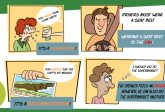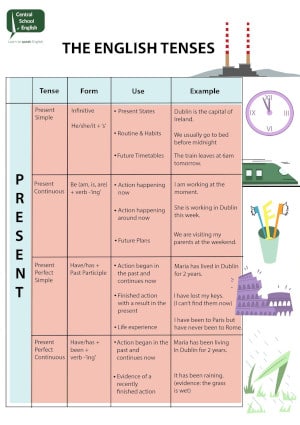Talking about the future

People who come to Dublin to work and study English have very busy schedules and can often feel that they are completely swamped with all the work and study commitments that they have.
At the Central School of English we understand that no matter what line of work you are in, finding time to figure out a new language on top of maintaining a job can be very difficult indeed.
This blog focuses on three tenses that we use to speak about the future. We hope that if you have found yourself in hot water trying to learn grammar and use future tenses, this blog will help you understand things a little more clearly.
The blog will explain the differences in use between the present continuous tense, the future perfect tense and the future perfect continuous tense.
We hope that you will have the time to look over our blog and that this opportunity to learn English online free with the Central School of English will help you in your efforts to speak fluent English!
If you have any questions please feel free to pick our teachers’ brains!
The difference between the present continuous and future perfect tenses
What is the construction of the present continuous tense?
I am | You are | He/she/it is | We/you/they are + (Verb)ing
Example: We are going…
When do we use the present continuous to speak about the future?
We use the present continuous to speak about the future when we want to communicate that we have made a plan / when we want to speak about our plans.
Example 1: I am going on holiday.
It means: I have made a plan, so probably:
-
- I know exactly when I am going on holiday.
- I know where I am travelling to and I know when I am returning.
- I have bought my plane ticket.
- I have reserved a hotel
- I have paid for my flight
- I have asked for time off work
,
Example 2: I am meeting my friends in the city centre on Saturday.
I have made a plan, so perhaps…
- I called my friends yesterday and I asked them if they were free to meet me on Saturday.
- We decided to meet at the Spire on O Connell Street on Saturday at 3pm.
Example 3: Ivan is starting university in September.
This is a definite plan, so perhaps:
- Ivan applied for university six months ago
- The university received his application and offered Ivan a course
Ivan accepted the course
What is the construction of the Future Perfect Tense?
I | You | He | She | It | We | You | They | + will + have + Past Participle
Example: I will have eaten…
When do we use the future perfect simple tense?
We use the future perfect simple to say that an action will be completed before a particular point in the future. The action may have started before now, maybe starting now or may start in the future
We always refer to the particular time when the action will be completed. So, We use the future perfect tense with time expressions such as:
By the time
By 10pm tomorrow
By tomorrow morning
Before I leave home
Before I eat my breakfast
At 5pm this evening
By the end of September
By 2017
Example 1: I will have cooked dinner by 6pm tonight.
In this example the speaker is communicating that they will have finished cooking dinner sometime between the moment of speaking and 6pm.
Example 2: By the end of the week I will have painted all of the bedrooms a new colour.
In this example the speaker is communicating that they will have finished painting and decorating the bedrooms in their home sometime between the moment of speaking and Sunday.
What is the construction of the Future Perfect Continuous Tense
I | You | He/She/It | We | You | They + will + have + been + (verb)ing
Example: I will have been studying…
When do we use the Future Perfect Continuous Tense
We use the future perfect continuous tense to speak about the duration of an action up to a particular point in the future.
When we use the future perfect continuous tense we use for and a time expressions to indicate the length of time the activity will be in progress.
Example 1: By next October I will have been studying at the Central School of English for six months. I hope that I will be fluent!
Example 2: By the time our plane lands we will have been flying for 13 hours. I am going to be exhausted!
[WpProQuiz 3]
Idioms
To be swamped: to have too much work to do,
To pick somebody’s brains: to ask someone many questions so that you can learn from them
To be in hot water: to be in trouble
Line of work: job field/ type of work
Phrasal verbs
Figure something out: to come to understand something/someone better
Look something over: to check/examine
Find out: gain knowledge about something
[WpProQuiz 4]
Thank you for reading our post. You’ll find more English grammar tips elsewhere on our site and if you’d like information on our English courses in Dublin, please do not hesitate to contact us.





